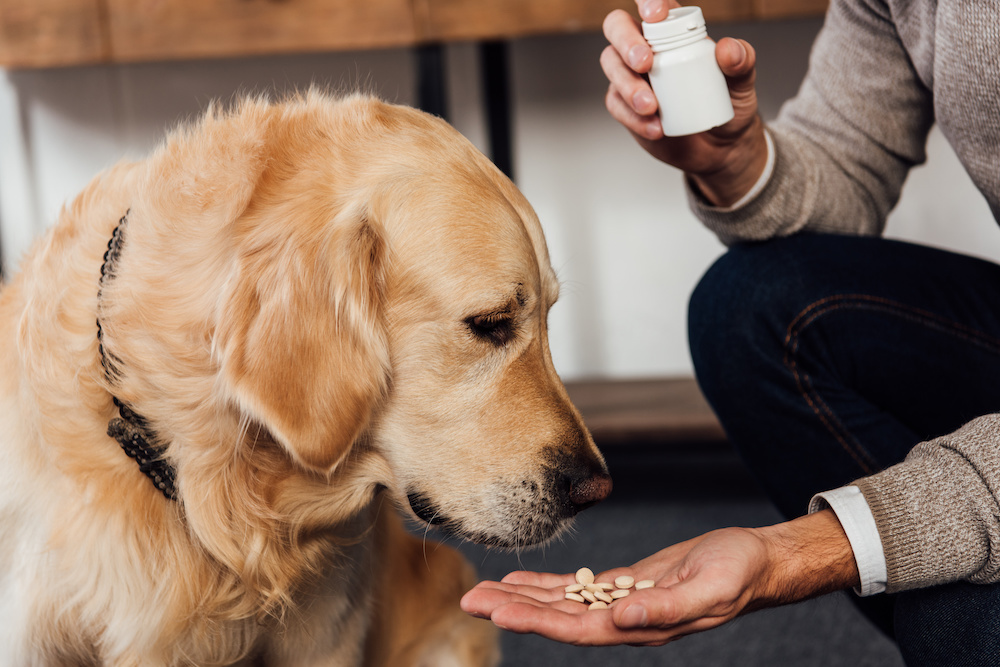Side Effects of Dog Joint Supplements
We may earn a commission for purchases using our links. As an Amazon Associate, we earn from qualifying purchases.
Dog joint supplements are among the most popular things dog owners choose to add to their dogs' diet.
No one wants to see their pet suffer from debilitating joint conditions, and supplements can help.
Are there side effects of dog joint supplements that owners should be aware of before they start using them?
Knowing about side effects is important.
Most are not serious, but to best care for your pet, you should be able to recognize if they are happening.
Serious side effects from joint supplements are rare but possible.
And not knowing what to expect could lead to a critical mistake, so it is important to get educated.
Today, you can learn more about supplements, the most common types, and what side effects you might encounter.
What Are Dog Joint Supplements For?
What are the benefits of using joint supplements, anyway? Are they a good choice to give to pets?
To understand why joint supplements are beneficial for dogs, you must first understand joint problems commonly seen in dogs.
Common Dog Joint Problems
There are a number of ailments that affect your dog’s joints.
Hip dysplasia and arthritis are the two most common problems, but they are far from the only things that can affect your dog.
Dog joint problems are any condition that is caused by or causes issues with your dog's joints.
Usually, these issues are either developmental or degenerative.
Developmental conditions are caused by genetic issues or growth issues that occur while the body is still growing.
Degenerative conditions happen whenever specific parts of the body wear down over time, such as the ligaments around joints.
When joint conditions happen, they can cause stiffness, pain, discomfort, and several other unpleasant symptoms.
How Do Joint Supplements Help?
Many people choose to give their dogs a joint supplement as a form of treatment and preventative care for joint issues.
Joint supplements are compounds that can help the body limit the effects of joint problems and prevent joints from getting worse.
Usually, these supplements include ingredients such as glucosamine and chondroitin, which are both known to effectively support joint health.
These ingredients work together to repair the cartilage and other ligaments around the joints.
As a result, this reduces further degeneration.
Are Joint Supplements Safe for Dogs?
Yes, joint supplements are safe for most dogs to take.
It is always good to consult your vet before starting a new supplement to be sure that it will not interact with any current medications.
That being said, most dogs will be safe to take joint supplements.
Joint supplements are safe for dogs as long as you are choosing an all-natural product intended for dogs.
You should always watch your dog for any potential side effects after choosing a new supplement, and keep in touch with your vet, as well.
If you don't see any results within six weeks, talk with your vet about other options.
Side Effects of Dog Joint Supplements
Like all medications and supplements, it is possible to see some side effects when your pet starts taking dog joint supplements.
Thankfully, most dog joint supplement side effects are very mild and are likely to go away after adjusting the dosage.
When your dog first starts taking a supplement, make sure you look out for any of the following symptoms:
- Allergic reactions
- Insomnia
- Restlessness
- Fatigue
- Digestive issues
- Excessive thirst
- Frequent urination
It can be hard to know if your dog is having these types of symptoms, so you will need to monitor them closely.
Monitoring for allergies, in particular, is very important.
When does are facing an allergy issue, you may see the following signs and symptoms:
- Licking
- Itching
- Bald spots
- Pigmented spots
- Diarrhea or vomiting
- Other digestive issues
- Skin infections
When it comes to joint supplements, most side effects are minor and related to the digestive system.
To alleviate these effects, try giving your dog their supplement with a full meal rather than just a treat or on its own.
For many dogs, this eases all side effects.
If that doesn’t work, though, stop giving them the supplement and get in touch with your dog’s vet immediately to avoid serious complications.

What Is a Good Joint Supplement for Dogs?
There are many different ingredients that may be included in common joint supplements.
When choosing a supplement, look for these all-natural ingredients to find the best fit for your pet.
- Glucosamine
Glucosamine helps your dog’s body better lubricate their joints while also improving the health of connective tissues at the joints.
- Chondroitin
In combination with glucosamine, chondroitin helps to develop extra cartilage.
- Fatty Acids (Omega-3 EPA and DHA)
Fatty acids are good for their anti-inflammatory features.
Most dog’s bodies don’t make enough fatty acids on their own, which is why a supplement with fatty acids may be necessary.
Not only are these good for joint conditions, but they also have a number of other significant health benefits for dogs.
Remember, it is always a good idea to talk with your vet before adding a supplement to your dog’s diet.
Glucosamine and Chondroitin for Dogs
As mentioned, glucosamine and chondroitin are known to be two of the most common joint health supplements for dogs.
What is it about these two compounds that work so well on preventive joint care?
Since these are the most used ingredients, do they cause side effects, too?
Glucosamine
Glucosamine is a natural compound used in many dog joint supplements.
This compound helps the body increase the amount of fluid that lubricates the joints.
Additionally, it has been shown to have positive effects on joint resiliency and connective tissue regeneration.
The cartilage around the joints will increase, preventing degenerative conditions from having such strong effects.
In short, it ensures that your dog’s joints are healthier and stronger.
Glucosamine side effects in dogs are, thankfully, rare.
The most common side effects are all related to the digestive system.
These side effects, including vomiting and diarrhea, can often be eliminated by giving the supplement to your dog together with a full meal.
This usually reduces the stress put on the digestive system by the supplement.
Does Glucosamine Have Side Effects in Dogs?
Though rare, here are the known side effects of dog joint supplements with glucosamine:
- Allergies (especially if the cartilage is sourced from shellfish)
- Insomnia and fatigue
- Lethargy
- Excessive thirst
- Frequent urination
Additionally, there are some vets who feel that glucosamine-based supplements are not the best choice for severely diabetic dogs.
This is because glucosamine is a sugar-based substance, which means it could cause unexpected results because of diabetes.
Can Glucosamine Kill A Dog?
Generally, a dog-specific glucosamine joint supplement is not going to cause any problems for your dog.
If you were to give your dog human-strength glucosamine or a dose far too large, this could lead to a glucosamine overdose.
This type of overdose can be fatal as it causes the liver to fail.
Make sure to only use glucosamine made for dogs and that you are always following the dosage instructions.
Otherwise, glucosamine is known to be safe.
Chondroitin Side Effects in Dogs
Another substance that is often found alongside glucosamine is chondroitin.
Chondroitin is only very effective when used in combination with glucosamine, but together they can have huge benefits.
They work together to promote better cartilage development, which, in turn, works to protect your joints.
Both substances are normally used to build up healthy cartilage.
While they cannot reverse arthritis completely, they can slow the onset of symptoms.
Like glucosamine, chondroitin can have mild side effects, such as allergies.
If your pet is allergic to shellfish, be sure you choose a supplement that sources its ingredients from non-fish sources.
When Should I Start Giving My Dog a Supplement?
If you are worried about your dog's joint health, you are probably wondering when you should start giving them a supplement.
Generally, it is OK to start treatment with a joint supplement as soon as your dog is fully grown.
For larger breeds that are more prone to joint problems, it is OK to start earlier, around nine or 12 months.
These breeds tend to face joint degradation much sooner than other breeds.
Starting them on supplements earlier can help reduce this risk.
As always, be sure that you follow the guidelines of a particular supplement and your vet’s advice before giving your pet supplements.
Dog Joint Supplement Side Effects
Glucosamine and chondroitin for dogs can be a great way to give them the additional support they need to keep their joints healthy.
Still, you should be aware of glucosamine side effects in dogs, such as allergies, itching, and an upset stomach.
Almost all of these side effects can be managed through changes in exercise or diet, though. So, the key thing is to be aware of when they happen.
Ultimately, you will need to weigh the pros and cons of these supplements.
Are the benefits going to be worth the risk of side effects?
For most dogs, the supplements are worth the risks, but every owner will need to make that choice for their pets themselves.

